TOM FRANCIS
REGRETS THIS ALREADY
Hello! I'm Tom. I'm a game designer, writer, and programmer on Gunpoint, Heat Signature, and Tactical Breach Wizards. Here's some more info on all the games I've worked on, here are the videos I make on YouTube, and here are two short stories I wrote for the Machine of Death collections.
Theme
By me. Uses Adaptive Images by Matt Wilcox.
Search
The West Wing
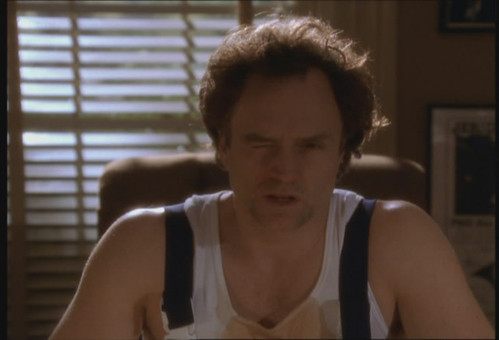
Despite being utterly unlike anything else I like in theme or type (it’s a White House drama (you might think that’s obvious from the title, but if so you’re probably American – I’ve still never heard of the West Wing outside of this series)), it’s absolutely brilliant. One thing about it goes some way to explaining the anomaly, though – it’s a fantasy. I imagine people who keep up with politics could have a nasty experience trying to swallow its picture of a government in which a near-perfect tension between pure democracy and educated liberalism decides policy, and the people in power are all heartbreakingly good-willed and astonishingly talented. To call it arrogant for that is like accusing Star Trek of exaggerating our space-travel capabilities. Not a documentary! Fiction is where they tell you a story and, while knowing the story isn’t true, you follow the plot and maybe enjoy it. Where did we get this idea that art’s supposed to just record what things are like? That’s a talentless, menial task (says a journalist); art should be fantasy, it should use imagination to show how things could be and get people excited at the idea. Beyond entertainment, that’s its only task, and it’s a much loftier and more important calling than commenting on how things really are.
The thing that sticks with me from The West Wing is the culture of highly qualified people working incredibly hard out of dedication to what they do – not why they’re doing it. Sam and Toby are relentlessly perfectionist about their own and each other’s writing because they love writing and couldn’t bear to see bad writing used, not because of a sense of duty to their country. Writer Aaron Sorkin clearly models them on himself, and the fact that he works in entertainment while they run the country implies no difference in their passion and determination. He wrote virtually every episode of the show himself, right up to the end of series four (when it mysteriously lost all its wit and heart), and – let’s be honest here – frequently took drugs to do it. I’m not the same at all, of course, but occasionally I catch myself thinking like this – using my spare time to rework something sub-par even though I’m sure it would have been accepted. The profound thing about the West Wing is that it paints a fantasy so admirable it actually inspires you to improve yourself. It ingrains you with the idea that a thing is worth doing well at virtually any cost.
The characters talk as fast as air-traffic controllers, only the jargon is not so much jargon as a mix of brilliantly argued moral points and hilarious stupidity. The political situations are eerily like recent real ones, and the action taken is a compelling compromise between liberal and what people actually believe in: the Democrats are in power, and president Bartlett (played by Martin Sheen, incidentally) is a particularly left wing (and underlyingly geeky) one. Every issue is discussed with a thoroughness and fairness (not to mention articulacy and, an unavoidably recurring word, intelligence) that impresses even me, a sceptic philosopher derisive of the attempts of any other discipline to even argue coherently, let alone exhibit any kind of rational intelligence. The arguments for the ‘other side’ are alarmingly persuasive, and a couple of times it’s genuinely changed my stance on things.
But the issues are very much secondary to the characters, for me – there are perhaps five who aren’t fantastic and compelling and vividly human, so to do the others full justice, I will list ten of them by first name in descending order of greatness: Toby, Josh, Will, Sam, Donna, Margaret, Leo, CJ, Charlie. Detailing what I like so much about each of them would be a mammoth (though strangely tempting) task, so I’ll just skip over some highlights: Toby is just fantastic all the time – grouchy, brilliant, and absurdly restrained when he’s happy; Josh and Donna’s relationship is a horribly touching combination of superficial spite masking genuine affection; Margaret’s perfect deadpan conversations with her perpetually frowning boss Leo.
Series Notes: the first two series are relentlessly brilliant, with several of the best ever episodes in the second; but then the third starts off with three or four… not bad episodes as such, just a bit grim. It’s all struggle and hostility, whereas no other episodes before that had ever lost their good humour and multi-facetedness. Shortly into the series, though, it gets great again, and stays at the old stellar standard. Then the fourth series… wow. It’s like The West Wing Plus: everything about it is even better, and the energy and pace of it is completely exhilerating. As for the finalés, the first series’ was fantastic, the next two weren’t really cliff-hangers or even very interesting, but the fourth is another explosive one, taking four long-running plot-lines to breaking point and leaving them there, and also featuring two remarkable firsts: one of the characters running (it’s not usually a very athletic programme); and a white ending screen (every other episode has a black one).
Or, it would be if that was actually the last episode. I later discovered that the fourth series, inexplicably, has a twenty-third episode, which utterly breaks the cliffhanger and leaves the series at a boring stalemate, and doesn’t have the fade to white. After that, Sorkin no longer writes the show, and while it seems superficially similar, the heart is gone from it. Series five, as far as I could muster the interest to watch, focused on dramatic global events, turning it into a political thriller rather than a personal drama set within the political arena. I haven’t watched much of series six, again because I dislike what little I have: my problem with that one stemming from the characters. They were delicate things as Sorkin crafted them, more human and believable than we’re used to on TV, and in other writers’ comparitively clumsy hands they break. Their subtle internal logic has gone, and their actions become inconsistent – just slightly, way less than on any other show, but it ruins the illusion nonetheless.
Series seven really perks up. Nothing like as good as a Sorkin series, but because it’s mostly new characters, and in a new environment, starting something new rather than trying to continue what was started in Sorkin’s episodes, it feels like a different show with a few familiar faces, and the mere-mortal writing is easier to swallow. It never got terribly exciting, and there were only a few touching or funny moments, but it was a nice way to go out.
Quotes:
(Donna is pressing Leo for official word on the news that the president crashed his* bicycle)
Leo: He was swerving to avoid a tree.
Donna: And what happened?
Leo: He was unsuccessful.**
* Actually it was Leo’s bike, but I’m not usually a trivia person. So I won’t tell you how much it cost or what metal it was made of.
** I tell this to some people and they don’t laugh. It’s not possible that they might have a higher standard of humour than me, so maybe they just don’t get it: the usual form of an explanation of an accident starting with ‘he swerved to avoid an x’ would finish ‘and hit a y’ (where x is a fast-moving object somewhere where it shouldn’t have been, and y is the kind of thing you would normally be able to easily avoid, like a tree), but in this case the president, being a dork, just cycled straight into a tree, under no unusual circumstance. The humour lies in the way Leo starts the explanation in a way that sounds acceptable, Donna notices that he’s used the tree as the ‘x’, which is what she knows the president hit, so presses him to see how he’s going to get out of naming a ‘y’ without contradicting the fact that it was a tree he hit, and his answer is funny. Yes, part of my explanation of why it’s funny is “It’s funny.”
Christian Right: Mr President – if our children can buy pornography on any street corner for five dollars, isn’t that too high a price to pay for free speech?
Jed: No.
Christian Right: Really?
Jed: I do think five dollars is too high a price to pay for pornography, though.
(Leo and Jed are approaching a plane whose engine is roaring loudly. Leo has just finished a phone conversation with Bruno and Hess)
Leo: I just got off with Bruno and Hess.
Jed: I’m sorry?
Leo: I said I just got off with Bruno and Hess.
Jed: You didn’t say ‘Michigan sucks’?
Leo: No sir.
Jed: I thought you said ‘Michigan sucks’.
Leo: I’m standing very close to the engine, so it may have sounded like I said ‘Notre Dame is going to get the ass-kicking they so richly deserve’.
(Donna has finally found Josh a flight that doesn’t involve a change at Atlanta and booked him on it)
Josh: Cancel it.
Donna: Why?
Josh: I need a layover in Atlanta. I need to get there around an hour before an eight o’clock flight would take off.
Donna: That would be around seven.
Josh: Well, I haven’t done the math.
CJ: Duchamp was the father of Dadaism.
Toby: I know.
CJ: The dadda of Dada!
Toby: It’s like there’s nothing you can do about a joke like that – you see it coming, and you just have to stand there.
Leo: I think your wife’s not going to like it.
Toby: My ex-wife. No, she’s not. Why do you call her my wife?
Leo: It bothers you.
Toby: Everything bothers me; you pick that?
Josh: Leo, ask me how long a Martian day is.
Leo: No, I don’t think I will.
Sam: I need you to tell me everything you can about the superconducting supercollider.
Physicist: How much time do you have?
Sam: About ten minutes.
Physicist: If you pay close attention and stay very, very quiet I can teach you how to spell it.
(Some women protested against Abbey Bartlet by turning up to one of her speeches in aprons and with rolling pins)
Sam: Why were there rolling pins?
CJ: Brenda Swetland: At this moment you’re not licensed to practise medicine, correct? A. Bartlet: At this moment I’m just a wife and mother.
Sam: I don’t see it.
CJ: You’ve got to want it.
Sam: Oh. I see it.
CJ: Yeah.
Sam: What’re we doing?
CJ: Well, I wanted my office to issue a statement saying “You’re annoying, shut up,” but Bruno said to wave at it, and he’s right.
Jed: Toby, why are you smiling?
Toby: Happiness is my default state, sir.
(Toby is reading what Sam’s typing)
Toby: That’s good… good… okay… Sam, you’re going to come to a verb soon, right?
Sam: Okay, you know what this is called?
Toby: Bad writing?
Sam: Imagery.
Toby: I’m not coming in the car?
Jed: No, you know why? Because you made fun of the guacamole.
Toby: I didn’t!
Jed: I could tell you were thinking it.
Toby: Fair enough.
(Toby is trying to come up with a statement for the press secretary to give in defence of their nomination for attorney general)
Toby: He’s tough on crime, fair on justice, say that. On no account say that. What is that? He’s tough on crime, fair on justice, wears a moustache, sings a song? What’s happening to me?
Josh: Was it a good game?
Sam: You know what I’d do if- no, it wasn’t a good game. You know what I’d do if I had a hockey team?
Josh: What?
Sam: I’d hire a sumo wrestler. I’d give him a uniform, transportation, five-hundred bucks a week to sit in the goal, eat a ham sandwich and enjoy the game. My team’d never get scored on.
Josh: Your team would get scored on constantly.
Sam: Yeah, but we’d sell a few tickets.
Josh: Yeah, because sumo wrestling always sells out in hockey towns.
Sam: My idea’s totally inviable?
Josh: Well, you’re a democrat.
Donna: (talking about a Chinese satelite) It was in what’s called a degrading orbital path, and it’s now dropped off their radar, suggesting it’s started a rapid descent towards Earth’s atmosphere.
Charlie: Cool.
Donna: It’s not! What’s the matter with you people?
Charlie: What did I do?
Donna: A thing the size of a garbage truck is going to be in a two-thousand mile-an-hour freefall and no-one knows where it’s going to hit!
Charlie: I’m rooting for Zurich. I’ve had it up to here with the Swiss.
Toby: I need you to back up Albie Duncan.
Andy: Is he crazy?
Toby: No. No, no. No. A little bit.
Andy: Toby?
Toby: He’s Albie Duncan, he was in the Eisenhower State Department, he’s brilliant, he’s respected; if he’s crazy, I don’t want to be sane.
Andy: You’re not.
Toby: Excellent.
Josh: I’m getting subpoena’d again.
Delores: Oh I’m sorry dear. D’you want a cookie?
Josh: Thanks.
Senator At Alcoholics Anonymous Meeting: Okay, I haven’t chaired in a while; what do we do next?
Agency Director At Alcoholics Anonymous Meeting: Now’s when we usually start drinking.
Other Senator At Alcoholics Anonymous Meeting: Actually there is one thing I’d like to talk about before we start.
Senator At Alcoholics Anonymous Meeting: If you’re going to try and get me to fund that idiot-ass airplane that can’t fly…
Other Senator At Alcoholics Anonymous Meeting: It can fly.
Senator At Alcoholics Anonymous Meeting: Yeah, it can fly, it just can’t land.
Federal Judge At Alcoholics Anonymous Meeting: That’s a small price to pay for being able to fly.
Clips: hammer.avi (15MB) cat.avi (5MB)
Firefly
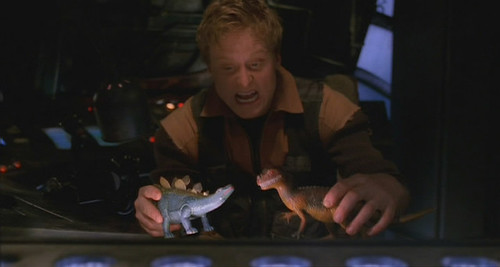
The opening spiel summarises the background rather concisely, so I’ll quote it for anyone who’s never seen it (which is potentially a high percentage, because it’s only in the first run of its first series in the US, and has never been aired in the UK):
Narrator: The Earth got used up, so we moved out and terraformed ourselves a whole new galaxy of Earths. Some rich and plush with the new technologies, others not so much. The central planets, them's formed the Alliance, fought a war to bring all the worlds under their control. Some idiots tried to fight it, among them, myself.
Notice no mention of aliens. There are no aliens. This is a stroke of brilliance – one that I’ve always been poised to paint myself, were I ever spontaneously commissioned to write a sci-fi series. The new galaxy is comprised of countless planets – the human population must be hundreds of billions – but no aliens, and not even anything in the way of separate evolutionary lines taken by remote cultures (it’s only three hundred years in the future). Who needs aliens? In other sci-fi shows, they all play human roles with a few crudely applied trends common to each species, which could as easily occur as traditions within a cut-off human society, of which Firefly’s universe has plenty. And you don’t have to lamely pretend a human in elaborate but wholly superficial make-up is from an alien race whose evolution shares nothing with that of ours.
Another piece of intelligent sci-fi on the part of the creator is that there are no sound effects for the space-scenes. I keep wanting to say they take place in perfect silence, but in fact gentle guitar music usually plays over them, but the point is that this makes sense – even when giant laser cannons destroy a whole ship in a massive fiery explosion, no-one who wasn’t aboard the target vessel would hear a thing – no air in space! No sound! Listen to a space-scene in Star Trek, and you’ll notice even the noise of the Enterprise drifting by is a deafening roar.
This intelligence is carried to every part of the vision, but there are other things that make Firefly great. The characters and their relationships in particular are wonderful – Mal is a funny and inoffensive captain (sounds like mild praise, but it takes some doing), the enigmatic preacher manages to be witty about being a Christian, and tough-guy Jayne (yeah) manages to be stupid, evil and arrogant in an enormously likeable way. The doctor, like virtually every sci-fi doctor, is brilliant, but it’s hard to characterise why – he’s just inappropriately civilised and doesn’t like Jayne. The pilot Wash is the true star, though – one of those meek, witty characters Joss Whedon always crafts more lovingly than the rest, like the blond geek from Buffy. This was meant as a list of my favourite characters for people who knew them, but it’s about 80% of the crew, so it might have been easier to specify the few I don’t find especially interesting. I’m not wild about Inara. That’s it. Oh, and the mysterious ‘hands are blue’ guys are easily the freakiest, most unsettling bad guys in TV. I hope that even if we find out what The Alliance did to River, we never get told why their hands are blue.
Lastly, it tries to be funny and is. This – and the captain’s slight resemblance to Angel* – is the only link I can see between it and Buffy: Firefly is firmly funnier, but the humour is kind of the same vein, and I have to admit it’s a vein to which I’m receptive.
* I now find out that he was actually considered for the part of Angel in Buffy, and in a series that hasn’t been on in this country yet, plays some other guy. In other cast notes, Zoe is a bad guy in Alias.
Series Notes: there’s only one series, and the last three episodes were never aired. Also, the two-part pilot was aired after the rest of the series, or rather what of the rest of the series they aired, and however much we all may despise Fox for this and all their other many, horrible crimes, I think we have to admit that the people responsible for all the fantastic programmes Fox has inexplicably cancelled would have gone with a different network if they could. In other words, they are the only ones prepared to show this stuff in the first place, so they’re doing something, they’re just doing it very badly. Anyway, more importantly the whole series, unaired episodes and everything, is now available on DVD, and hence on file-sharing programs. The DVD is around £20, $35, which is a total steal in my books, so I actually bought it.
Oh My Fucking God
There’s a film, the trailer is here, and it’s out on 30/09/2005. I’ve never been this excited about a film.
Quotes:
(Mal has inadvertantly been given a wife as part of a trade, and she wants to sleep with him)
Preacher: If you take advantage of her in any way whatsoever, you are going to a very special hell reserved for child-molesters and people who talk in theatres.
(Later)
Caylee: Hi shepherd. Captain was just telling us about his kiss with Saffron.
Preacher: Oh, how… special.
Jayne: We can’t change that. We’re getting all… bendy…
Wash: All what?
Jayne: Got the lights of the console… keep you… lift you up….. they shine like… little angels! (grabs at air, falls over)
Wash: (stares at unconscious Jayne for a moment, then looks up) Did he just go crazy and fall asleep?
Wash: A mind-reader, though? That sounds like something from science fiction.
Zoe: You live on a spaceship, dear.
Preacher: I just feel such a fool.
Jayne: Yeah, all those years of priest training… taken out by one bounty hunter.
Lost
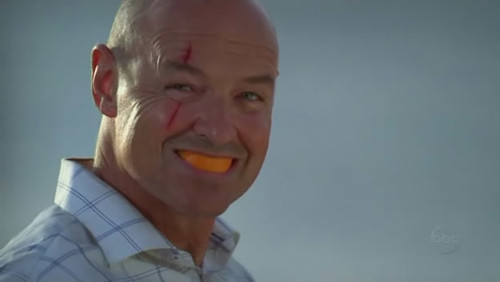
Lost is almost inexplicably better than it sounds – a bunch of people stranded on a tropical island after a plane crash, brought together by FATE, each with SECRETS, which we find out about through FLASHBACKS. I should have known it wouldn’t be long before amnesia featured in the plot. JJ Abrams’ last series Alias was good, but it’s not any more and it was never this good. This is genuinely brilliant television, the kind you could just string together to make a great film.
If Alias was defined by its ridiculous cliff-hangers, Lost is defined by ridiculous mysteries. Since the start of the series twenty-five episodes ago, the following elements have cropped up and been developed to the extent detailed here:
- The Monster: We don’t know anything about the monster. It might be big. It might not exist. It could also be robotic or organic, or ethereal, or none of these.
- Jack’s Dad: Jack’s Dad appeared. We don’t know why or what was going on.
- The Hatch: Locke discovered a hatch. We don’t know what it’s doing there or what’s inside, or what the thing is it’s built into. Since the hatch was discovered, virtually every episode has been about it. So far, we have discovered: nothing. Once the hatch lit up. We don’t know why.
- The Numbers: Hurley won the lottery with some numbers. They might be cursed, or not cursed, or it might be fate. Or magic.
- The Others: There might be others on the island, or there might not, or they might not be on the island, or they might not be others. If they are and they are we don’t know who they are or what they’re doing there or what they want.
- The Kid: The kid knows something about the hatch. We don’t know how or what and now he’s gone forever.
- The French Woman: There is a French woman on the island. Something killed the crew she was with. We don’t know what and now she’s gone mad.
- The Polar Bear: A polar bear appeared. We don’t know why or where it came from or how it got there. It was killed and never mentioned again.
- The Other Half Of The Plane: We don’t know where it is or what happened to the people on it. They might be still alive, or dead, or trapped sixteen years in the past with a magic time-traveling radio.
- The Island: The island might have a will of its own, though it might not and if it does we don’t know what it is, why it has it, or how it works.
Whichever of these wildly vague concepts you might be hoping for clarification on, you’re perpetually disappointed. The appeal is that by failing to resolve any of these plot lines, they’re never cheapened by specifics. Their enigma gives them a lasting menace that only improves the tapestry of sinister threats mounting around the ever-diminishing survivors. All of them verge on the mystical without being scientifically inexplicable – given a degree of imaginative license. We still don’t even know what genre we’re working in – sci-fi, fantasy, supernatural or real-world.
But the writers seem content to leave that ambiguous too – they’ve got plenty of stories to tell in flashbacks to the castaways’ previous lives, and some of those have been extraordinary. The glimpses of the mysteries, too, have been expertly judged. The one ‘Other’ we’ve seen – despite being just some guy – is one of the most unsettling bad guys ever. Even small things like making sure you realise dynamite is dangerous – they have the dynamite expert annihilated by it when handling it as carefully as he can, and from then on you’re screaming at the characters to walk slower, don’t put the dynamite in their packs, don’t use flaming brands for torches.
Locke: Hugo, take these extra sticks back a couple hundred yards.
Hurley: Me? Oh, okay. Got it. ... Can I have a flashlight? 'Cause, er, the torch-near-the-dynamite thing's not making a whole lot of sense to me.
Which leads nicely into the other reason it’s great: Hurley. On paper he sounds awful – a fat comic relief character who just says “Dude,” “Yo,” or “That was messed up” at oppourtune times. But that fails to take into account the sheer brilliance in the timing of his Dudes, Yos and That-was-messed-ups, and also that he says them flatly, rather than in the Keanu Reaves surf-slang drawl. Essentially he’s just a guy who watches a lot of TV, in a TV series, saying the things you feel like saying yourself (as above).
The comments below assume you are up to date with the story as it’s being aired in the US – they may spoil things for you if you’re not.
A Big List Of Music I Like
The New Pornographers
The Laws Have Changed; A Testament To Youth In Verse; Chump Change
Genre: dazzling, explosive power-pop
Belle And Sebastian
Sleep The Clock Around; I’m A Cuckoo; Seymour Stein
Genre: meek, fey indie-pop
The Delgados
Favours; The Light Before We Land; Witness
Genre: majestic, orchestral indie-pop
Arcade Fire
Tunnels; Lies; In The Back Seat
Architecture In Helsinki
What’s In Store; The Cemetary; Wishbone
Clinic
The Magician; Welcome; Thank You For Living
Decemberists
July, July; Angel Won’t You Call Me?; The Soldiering Life
Gomez
Do One; Catch Me Up; Rex Kramer
Low
Step; Canada; California
Mates Of State
Goods (All In Your Head); Whiner’s Bio; Ha Ha
Radar Brothers
You And The Father; Shifty Lies; Rock Of The Lake
Seedling
The Upshot; Endora; High On The Downside
Sleater-Kinney
Let’s Call It Love; The Fox; What’s Mine Is Yours
Smog
Feather By Feather; Lazy Rain; River Guard
Stereolab
Speedy Car; Cybele’s Reverie; Metronomic Underground
Yo La Tengo
Moonrock Mambo; Damage; Autumn Sweater
AC Newman
The Town Halo; Miracle Drug; On The Table
Add N To (X)
Party Bag; Hit For Cheese; Metal Fingers In My Body
Air Miami
Dolphin Expressway; I Hate Milk; Sweet Little Heartbreaker
Aluminum Group
A Blur In Your Vision; Two Lights; Rrose Salivy’s Valise
At The Drive-In
One-Armed Scissor; Alpha Centauri; Pattern Against User
Ballboy
Nobody Really Knows Anything; Where Do The Nights Of Sleep Go To When They Do Not Come To Me?; I’ve Got Pictures Of You In Your Underwear
Belly
Super-Connected; Untitled And Unsung; Now They’ll Sleep
Ben Folds
Landed; Rockin’ The Suburbs; Not The Same
Ben Folds’ Five
Army; One Angry Dwarf And Two-Hundred Solemn Faces; Narcolepsy
Black Box Recorder
Girl Singing In The Wreckage; Goodnight Kiss; Weekend
Camera Obscura
Lunar Sea; Eighties Fan; Teenager
Cat Power
Nude As The News; Maybe Not; Speak For Me
Cinerama
Health And Efficiency; Love; Superman
Clint Boon Experience!
Comet Theme Number One; Only One Way I Can Go; Seventeen And Over
Cuban Boys
Cuban Boy 2000; Disco Boy; Kenny
Dirty Three
No Stranger Than That; Sea Above, Sky Below; Hope
Flaming Lips
Race For The Prize; Slow Motion; The Gash
French
Porn Shoes; Canada Water; The Stars, The Moon, The Sun And The Clouds
Go! Team
The Power Is On; Bottle Rocket; Panther Dash
Godspeed, You Black Emperor! *
Lift Your Skinny Fists Like Antennas To Heaven!**; Moya; Blaise Bailey Finnegan III
Goldfrapp
Tiptoe; Lovely Head; Horse Tears
Hefner
The Sweetness Lies Within; The Sad Witch; Wicker Girl
Interpol
One; Obstacle One; Obstacle Two
Jeffrey Lewis
The East River; The Chelsea Hotel; Springtime
Jim O’Rourke
Movie On The Way Down; Something Big; Through The Night Softly
Ladybug Transistor
A Burial At Sea; Choking On Air; Song For The Ending Day
Ladytron
He Took Her To A Movie; Flicking Your Switch; The Way That I Found You
M83
Lower Your Eyelids To Die With The Sun; On A White Lake Near A Green Mountain; Teen Angst
Modest Mouse
Float On; Life Like Weeds; Doing The Cockroach
Múm
Green Grass Of Tunnel; Weeping-Rock Rock; I’m Nine Today
Nena
?; Just A Dream; Rette Mich
Pavement
Roll With The Wind; Elevate Me Later; Unfair
Pernice Brothers
Number Two; Seven Thirty; Weakest Shade Of Blue
Pram
Penny Arcade; Mother Of Pearl; Track Of The Cat
Primitives
Laughing Up My Sleeve; Nothing Left To Say; I Almost Touched You
Prolapse
One Illness; The Government Of Spain; Cacophony Number A
Quasi
Better Luck Next Time; I Never Want To See You Again; A Case Of No Way Out
Radiohead
Sit Down, Stand Up; Fog; Dollars And Cents
Sigur Rós
Svefn-G-Englar; 01; Vidrar Vel Til Lofturasa
Ted Leo And The Pharmacists
Me And Mia; Walking To Do; Where Have All The Rude Boys Gone?
Telstar Ponies
A Little Cloud; The Fall Of Little Summer; Sail Her On
Trembling Blue Stars
St Paul’s Cathedral At Night; The Ghost Of An Unkissed Kiss; Haunted Days
Ugly Casanova
Hotcha Girls; Barnacles; Parasites
Virgin-Whore Complex
Wise And Mighty Emperor; Unrequited Love; I See More
Wilco
Jesus, Etc; Theologians; Company In My Back
Mulholland Drive
Genre: surrealist psychological horror.
Stars: Naomi Watts (American version of Ring), Laura Harring, Justin Theroux (apparently an Irish bad guy in the second Charlie’s Angels film).
Plot: a partially failed actress is dumped by the girlfriend who got her the few roles she ever had, for a man, and hires a hitman to have her killed. In her grief and guilt, she tries to reimagine her life in Hollywood with showbusiness gloss, but her dreams are haunted both by reality and terrifying symbols of death and dementia.
Why It’s Great:
- The plot is more complex than the top two films combined in some sort of really complex way: it’s probably not possible for a human mind to grasp it on first viewing, and because of that it – like any David Lynch film – has been made artistically beautiful enough to work as a rationally unintelligible surrealist piece.
- Dream is entangled almost inextricably with reality.
- Dozens of ingenious crossovers and quirks crop up once you make sense of it.
Adaptation

Genre: forget about it.
Stars: Nicholas Cage, Nicholas Cage, Meryl Streep, Chris Cooper (the homophobic dad in American Beauty).
Plot: tempting to say ‘forget about it’ again, but I’ll give it a go: a woman writes an article about a guy who steals rare orchids from nature reserves. The article is very popular, and a publisher asks her to adapt it into a book. She does, and calls it, like the article, The Orchid Thief. The book is very popular, and a producer asks screenwriter Charlie Kaufman to adapt it into a film. He tries, but can’t capture what he likes about it, and obsesses over his failure, ultimately writing first the entire history of the Earth, then himself, into the plot. Meanwhile, his admiring, friendly brother Donald takes up screenwriting himself, after attending a quicky course on it, exasperating his brother by coming up with lower-brow ideas typical of modern cinema and seeking Charlie’s approval. It’d take me about another paragraph of that size to explain the rest of the plot, then two or three more to qualify how much of it is actually true, and that the film he’s writing is in fact the film he’s in, which evolves dynamically as he, the character in it, makes decisions about how to save the screenplay he’s writing from either pretentiousness or never being finished. Instead, I just told you the plot of the plot summary I’d write if I was going to write the rest of this plot summary, but I did it rather cleverly within the plot summary itself, so perhaps I should have included the plot of the above plot summary before the plot of the rest of the summary, which doesn’t exist. I think I’m sooo goddamn clever.
By the way, I wasn’t just mocking myself there to mirror the relentless self-deprecation that consumes Charlie Kaufman when he realises what he’s done, I really do think what I did there was pathetic. If I wanted to mimic his self-deprecation, I’d do something like… well, see the last section called ‘Something Like…’
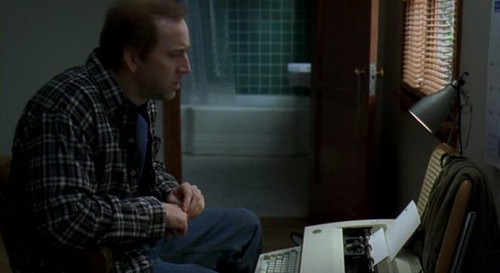
Why It’s Great:
- Well, check out the plot.
- Nicholas Cage – I’m so confused about how I feel about Nicholas Cage now that I can’t even remember how I used to; was he the annoying guy who always seemed to choose great films, or was he the basically decent actor who always got stuck in awful ones? Now that he’s been in Bringing Out The Dead and this, and I realise I really do like Con Air, I think I just plain like him. He’s fantastic in this, as both Charlie and Donald Kaufman, who spend a lot of time on screen together. You can’t make yourself believe for a second that they’re the same person, even though no attempt is made to distinguish them appearence-wise, beyond their wearing different clothes. The two roles would make a good litmus test for actors in general – can they make two identical-looking characters unassimilatably different? He can, and it’s a spectacular film, so he must be good.
- It’s hilarious. Not just Charlie’s self-loathing and Donald’s awful ideas, but the insane turns it takes toward the end, and the whole absurdly self-referential interaction between plot and genre.

A Quote: “Oh my God, I’ve written myself into my screenplay.” “That’s kind of weird, huh?” “It’s self-absorbed, it’s narcissistic, it’s solipsistic, it’s pathetic! I’m pathetic! I’m fat and pathetic!”
Something Like… Oh my God, I’ve written myself into my plot summary. It’s smarmy, it’s arrogant, it’s demeaning to the film, it’s pathetic! I’m pathetic! I’m stupid and pathetic!
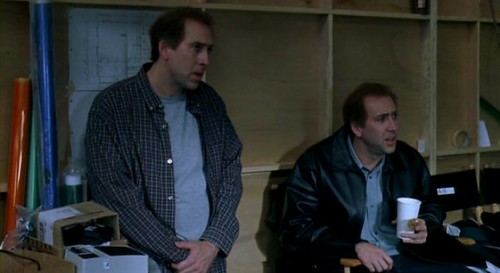
Grosse Pointe Blank
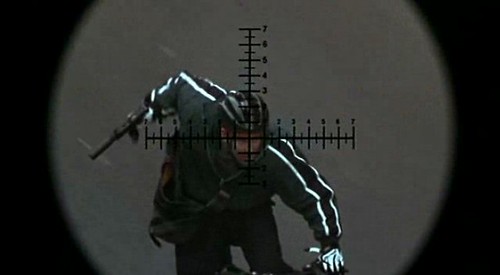
Genre: uh… romantic hitman comedy?
Stars: John Cusack, Minnie Driver, Dan Ackroyd, Jeremy Piven, Michael Cudlitz, Alan Arkin (Catch 22), Joan Cusack, Hank Azaria.
Plot: a hitman is hired to do a job in his hometown at the time of his ten year high-school reunion, and on the advice of his psychiatrist decides to attend and try to reconcile with the girlfriend he abandoned for a decade without a word, and maybe not kill anyone for a while.
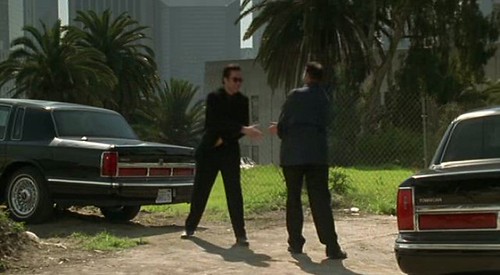
Why It’s Great:
- John Cusack.
- Both the electronic score by Joe Strummer and the all-eighties soundtrack are fantastic in their own rights, -and- brilliantly used. I Can See Clearly Now makes the opening credits and first scene unforgettably cool, and later on Mirror In The Bathroom accompanies a fight scene brilliantly.
- Assassination is inescapably appealing, and several of the gunfights are great – especially the final one, which features a frying pan.
- You’ll notice a second Cusack in the cast listing – there are actually four Cusacks in it altogether. I haven’t worked out who Bill is yet, and Ann’s appearence is very brief, but Joan is brilliant. She often plays significant roles in John’s films – even playing his character’s sister in Say Anything – and no-one cries nepotism because she’s really, really good.
- Jeremy Piven is always great, but this is his best character ever. I know you haven’t heard of him, but he was in the horrible Very Bad Things, and you’d probably recognise him if he was pointed out to you. Some of his quotes aren’t the best on paper, but when he says them, the “Ten years!” and “I was looking for a little validation on my life, but I guess I came up short” lines are some of the best in the film, and it’s a film of great lines.
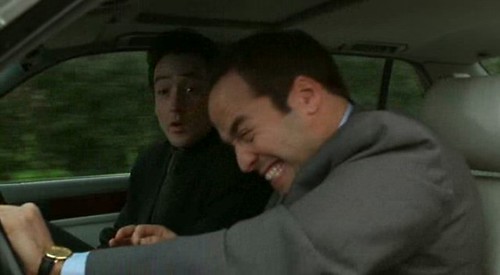
Quotes:
Waitress: What would you like in your omlette?
Blank: Nothing in the omlette, nothing at all.
Waitress: Technically that's not an omlette.
Blank: Look, I don't want a semantic argument about it, I just want the protein.
Grocer: Easy there, chief. I don't see hollow-point wound care on the menu.
Paul: I'll see you at the 'I've-Peaked-and-I'm-Kidding-Myself' party.
Blank: Debi's house.
Paul: Kinda crept up on you, didn't it?
Blank: No, you drove us here.
Paul: ... Yep.
Clips: school.avi (2MB)
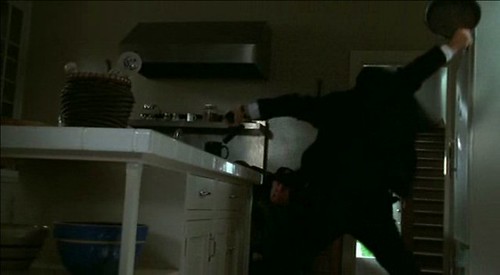
Memento
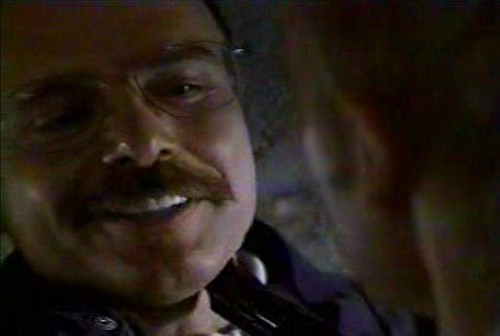
Genre: psychological thriller.
Stars: Guy Pearce (apparently in Neighbours at one point), John Pantoliano (the traitor in The Matrix), Carrie-Anne Moss.
Plot: an insurance claims investigator loses the ability to form new memories when he’s hit from behind during a struggle with a man he finds raping his wife, and tries to track down the second man with notes, tattoos and the help of a suspicious policeman friend. Half of the scenes are shown in reverse order, so that the film ends in the middle of its plot’s timeline.

Why It’s Great:
- The actual plot is astonishingly complicated and mind-blowingly clever.
- The intricate and beautiful scene-splicing interacts with the web of deceit and confusion brilliantly, unpicking it lie by lie.
- The two main characters are superbly written and are acted so compellingly that I still find them fascinating now, having seen it at least eight times.
- The fact that every scene starts with you having no idea what came before it mimics the protagonist’s condition cleverly, unravelling the plot in all the right backwards steps without keeping you in the dark about anything he knows.
- Although the themes are dark and even chilling, the atmosphere is mainly just exciting, and the dialogue and even plot are hilarious in parts.
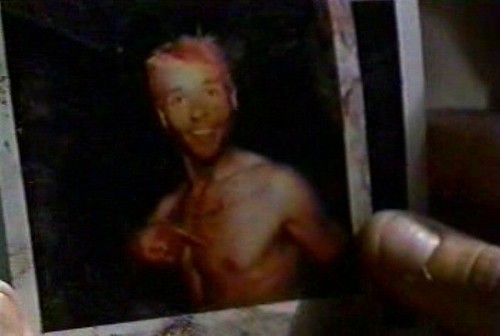
Timeline:
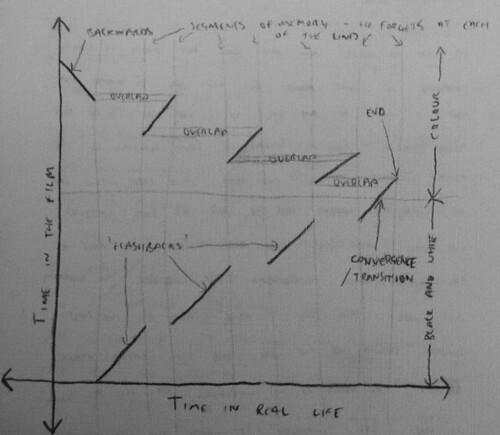
Quotes:
Lenny: (running) Okay, so what am I doing? (Seeing another man running) Oh, I'm chasing this guy. (The running man opens fire) No, he's chasing me.
LA Confidential
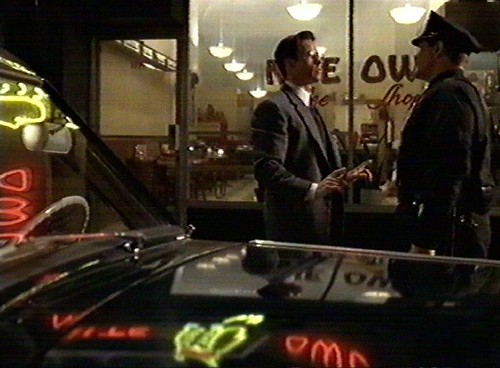
Genre: noir thriller.
Stars: Guy Pearce, Russell Crowe, Kevin Spacey, Danny DeVito, James Cromwell, David Strathairn, Kim Basinger, Ron Rifkin.
Plot: three Mexican kids are arrested for a coffeeshop massacre, but neither the straight-arrow arresting officer nor the violent colleague he hates so much think the case has been solved. Meanwhile, a reknown but low-ranking cop with ties to a popular TV show investigates a smut lead he can’t work out, but which he’s starting to think is connected.
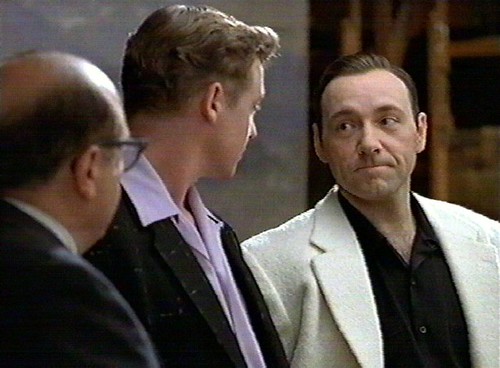
Why It’s Great:
- Not only is it based on a James Ellroy book, it’s a superb, Ellroy-esque version of it – despite not being written by James Ellroy. Ellroy himself commented, in very much his own words, “I can’t fucking believe it.”
- Ellroy-esque means mind-bogglingly complicated, subtle and dark. Typically for him, LA Confidential hinges on human weakness and corruption, scandal, drugs, ambition, revenge, hollowness, regret, and anger.
- The three leads and James Cromwell are incredible – the best performances I’ve ever seen from him or Spacey, both brilliant at their worst. The idea of different personality types coming together in the face of a greater evil is hardly novel, but their personalities are so profoundly convincing that it still feels like a revelation. It also helps that the moment Crowe and Pearce realise they’re on the same side, Crowe is in the middle of beating Pearce’s head against the corner of a filing cabinet. In the end, it’s a friendship that arises when it becomes clear they don’t have time to hit each other anymore. And it only becomes jovial when they’re both convinced they’re going to die.
- In fact Cromwell is probably the star of the film, as the brilliantly conceived Captain Dudley Smith, the only common thread in the three books and perhaps Ellroy’s biggest character. His key moment in the film – you know it if you’ve seen it – is extraordinary cinema.
The 40’s LA atmosphere is impeccable, and the whole thing has an amazingly sylish elegance. - The action is so expertly directed, so immediately gripping and volatile, that a simple hotel shoot-out makes The Matrix’s lobby scene look pathetic. These are gunfights that respect the fact that line-of-sight means death for one or the other party within a second. Death is vicious and sudden. Every shot has a serious, brutal consequence.
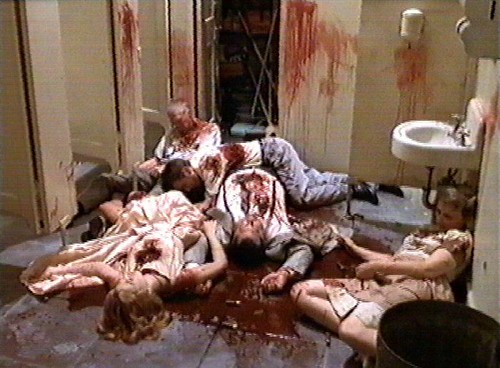
Quotes:
Scandal-Rag Journalist: Patchett's what I call 'twilight': he ain't queer and he ain't red. He can't help me in my quest for prime sinuendo.
Coroner: Stomach of the week from a motel homicide: the unemployed actor had frankfurter, french fries, alcohol and sperm.
Diablo 2
The Basics
Absurdly slick isometric action-RPG with real-time combat (clicking) and a bewildering array of spells (right-clicking).
The Appeal
It’s clear that the guys designing Diablo 2 were world experts on how to make character progression exciting, satisfying and an inspiring driving force to a game rather than a miserable dragging one. It’s also clear that they left Blizzard before World Of Warcraft. In Diablo every level-up brings a paralysingly tricky decision – every new skill is carefully hand-crafted to sound wildly exciting in text and have real use in combat. And you only get one per level.
Having whittled down the nonsense trappings of the RPG – story, quests, NPCs and the like – to virtually nothing, it proved that ‘grind’ is only a problem when your levelling system sucks. You suddenly realise other games are just trying to distract you from their uninspired mechanics when they ply you with a rich plot and a fascinating world. If your game’s actually good, you don’t need any of that – no-one feels like they’re grinding because they’re actually looking forward to getting that next level, and they’ll get there, and when they get it they’ll get something they want, and when they try it out it’ll be fun. All of this is achieved with the simple combat system, brilliant sound-effects, and perfectly judged skills. Roll on Hellgate London.
The Essential Experience
Corpse Explosion chain-reaction. The central dynamic here is that blowing up a corpse usually kills people, since it’s an extraordinarily powerful spell (the blast is proportional to the creature’s hitpoints), and that means more corpses. It gets to the stage at which the first casualty triggers a staggered apocalypse of bloody showers that annihilates everything on-screen. I remember in the blurb for the Necromancer class used in the manual – which I read about six months before release on a website – it said “While many shun the Necromancer for his ghoulish appearence and strange ways, all fear his power – for it is the stuff of nightmares.” You never really believe sales blurb until you’re blowing up corpses three times a second.
My highest-level character in Diablo 2, and functionally my favourite character in any game, was Pentadact the Necromancer. I started him with Bitchard the Barbarian (flatmate) and we played through the whole game and expansion pack over the course of a weekend. By the time we were finished, Pentadact was genuinely the stuff of nightmares. Skip past the giant skull he wore over his face, he was accompanied at all times by a hulk of rotting flesh and exposed bones, and carried a long, undulating, bright orange dagger called Pentadact’s Screaming Cinquedeas Of Pestilence – a single stab from which would send huge enemies scrambling away in fear, but infected with a poison so virulent that even if they escaped the inevitable corpse explosions, Poison Novas and Bone Spears, they faced certain death. I lost him and my characters in all games beginning with letters earlier than ‘q’ in the great ChkDsk error of 2005, so if you ever read about Microsoft employees being stabbed to death with a knife matching the above description, by a man holding a mop adorned with butcher’s offcuts, remember that I was always a quiet boy who kept himself to himself.
Battlefield 2
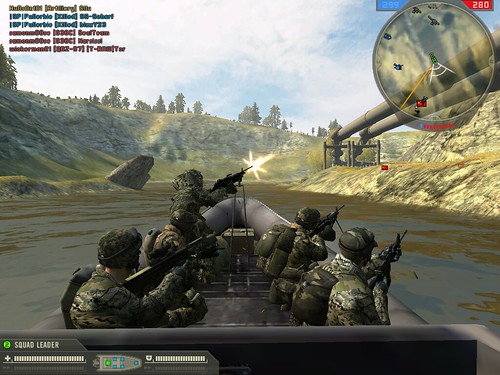
The Basics
You’re a soldier of a class of your choosing, on a vast battlefield with dozens of comrades and enemies, operating as part of a tightly knit squad which is in turn directed by your team’s commander.
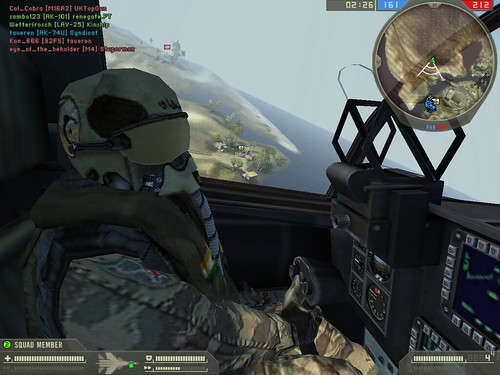
The Appeal
Camaraderie. So many mods and multiplayer games claim to be designed to encourage teamplay, but the only way they can think to do it is discourage solo play – making you rubbish on your own. All that does is make the game rubbish. Battlefield 2 assumes everyone’s a selfish idiot, and it’s exactly right. We’re only going to work together if it’s immediately obvious that it will benefit us personally, hugely and right away. I get as many points for bringing a friend back to life as I do for killing an enemy. I want to be in a squad because it gives me a new spawn point, always close to the action – I know I’ll have more fun if I join my squad leader. My helicopter is virtually useless unless I wait for someone else to get in to gun for me, and likewise my best chance at getting a lot of chopper kills is to let someone else have the flying fun so they can lead me to the bads while I concentrate on the killing. Everything that’s good for the team is good for me in exactly the right proportion.
Vacuous theory, all. The reality of Battlefield is about immediate friendship with strangers. It’s about a flood of affection for a name on the screen as he kills your enemy, brings you back from the dead, stops his car to pick you up, fixes your tank, chucks you a medikit. It’s following your squad leader to hell and back because he’s consistently shown dedication to the mission, concern for your safety and good judgement in both. It’s about trusting another man with your life, and immediately feeling his confident expertise guide you both to glorious, spectacular victory in an airbourne vehicle you know from experience it’s extremely hard not to crash. It is deeply homoerotic.
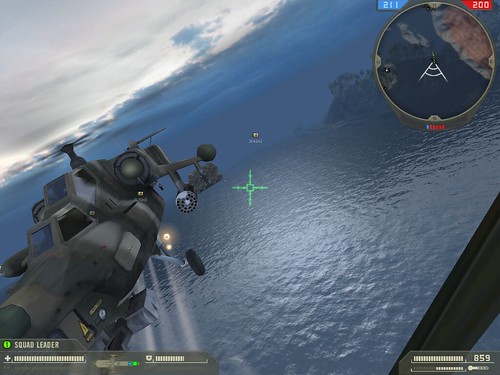
The Essential Experience
Throwing yourself off a dizzyingly high water-tower to parachute down to the body of your squad leader, who’s just slipped off after taking a sniper bullet to the face, so that you can restart his heart with your defibrillators. “Dammit, sir.”
Half-Life 2: Deathmatch
The Basics
Guns vs Filing Cabinets. Morons think this is the sequel to Half-Life Deathmatch and run mindlessly around spraying people with the feeble SMG. This is not that game. It’s a game where you fight two classes of enemies – cannon fodder grunts, armed with the standard Half-Life 2 weapons, and Gravity Jedis, artful duellists each with their own remarkable style which will clash with your own in a gripping battle of the titans. You, of course, are a Gravity Jedi. Aren’t you?
The Appeal
The raw physicality of it all. Shooting people with guns is a very hypothetical thing – unless it’s Soldier Of Fortune 2, you’re just clicking to make a hitscan check in code deduct HP from a hitbox until it turns into a ragdoll and gains some decals. If you fire a radiator at someone, you’ve fucking killed them. It’s immediately apparent.
I was enthralled by this. I’ve been playing it from the hour it came out, and while most Half-Life 2 owners toyed with it then rejected it as ‘merely fun’, I haven’t been able to stop. As part of the delightfully evocative shared lingo of some of the PC Gamer writers, we often talk of ‘crushing’ our enemies – this is the game where you can actually do it. Crush. No armour check is made, no super-health can save them, they can scour the whole map for the best weapon in the game – they’ll find, when you Gravity Gun an eight foot metal workbench into their neck, that they had it all along.
That ‘great equaliser’ element adds a beautiful twist to it. I am good at HL2DM, and when I’m at the top of the scoreboard, the idea that I got there with the starting weapon, the one everyone has all the time but doesn’t use, is uniquely satisfying. Only the élite stick to the Gravity Gun, and when you meet a fellow one the battle is extraordinary. Objects ricochet off each other in mid-air, rebound off walls and are re-caught before they hit the ground. Every piece of furniture, debris, wall-fitting and data storage device is vacuumed up and flung in relentless yet fluid exchange. Lesser players are smashed in the crossfire, casual shots catching them in the face, tables hitting the ceiling and dropping on them. It almost looks like an unhappy coincidence that everyone using a gun dies within seconds of entering the room, but there is something subtle but unmistakable in the way a Gravity Jedi moves, his instinctive feel for physics and his inhuman catching reflexes that renders him impervious to the hail of metal and plastic that pounds the rest of the room. When the first blow finally hits, it is the last – one is too busy catching the last throw of the other, or scooping up his next projectile, and a sink crashes into his skull. The victor stands up in his seat, punching the air. The defeated player shakes his head in deference, awe. Someone is as awesome as he.
The Essential Experience
The radiator kill. I could list my top fifty Gravity Gun objects without pausing, but top of the list is always the ridged wonder. Slim one way, broad the other, deadly both. Brutal mass, perfect ricochet, flat-surface slide factor high. Warm glow.
Deus Ex 2
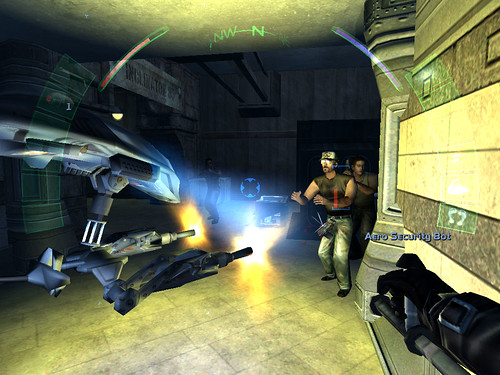
The Basics
Far-future this time, and you’re a mercenary nano-augmented agent with ‘biomods’ right from the start. You’re constantly given conflicting objectives by two parties, and who you obey will have major consequences for absolutely nothing. There will also be REVELATIONS and ALLEGORY.
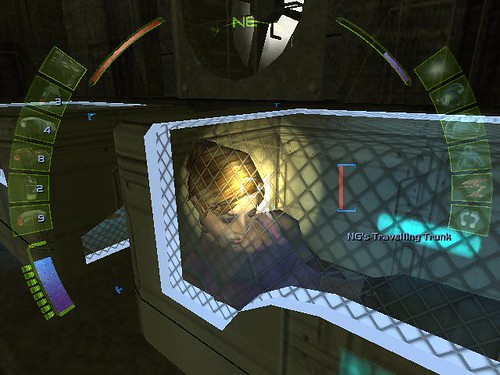
The Appeal
Mostly the Strength Biomod – it meant you could pick up a chair and throw it at someone so hard that they died. Actually that’s not really it, but before I get to it I should add that this is the first game in this list to have serious flaws. Whatever anyone might dislike about any of the above games, these people are wrong and ugly. But Invisible War was a bit stupid. Factions simply didn’t care if you stabbed them in the back again and again, so the only meaningful choice you actually had in the game was which cut-scene to watch at the end. The head of the Illuminati seemed irritated at worst if you stabbed the love of his life to death and blew up her corpse. And combat was only fun if you quadrupled the damage multipliers in the [Difficulty] section of the Default.ini file.
So what’s it doing so high up? To quote myself, “It’s not that there isn’t a huge ‘greatness’ chasm between Deus Ex 1 and 2, it’s just that nothing else is in that gap.” Not quite true, idiot, but there is a part of me that feels like Deus Ex 1 and 2 are the only games in the world – everyone else is just coming up with briefly amusing little toys.
2, like 1, is extraordinary because you genuinely invent your ways of tackling situations using the tools you’ve collected – rather than doing what the game designers intended, or choosing from a few set paths. And unlike 1, 2 had the visceral joy of tossing the bodies into a dumpster afterwards. The weapon mod system was vastly more meaningful, to the extent that one of my characters went through the game with four pistols – each modded to serve completely different functions. And while we’re at it, the biomods were much more useful – you could easily get by without them in the original, but here you wouldn’t want to. They all do cool things like take over bots, turn things off when you hit them, eat corpses or shoot enemies for you.
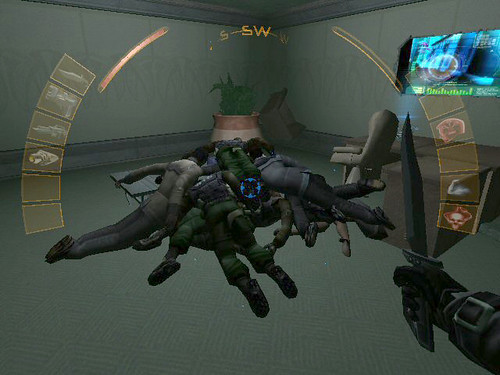
The Essential Experience
Punching someone in the face with the baton then flinging their unconscious form gracelessly into a skip. The baton was another little area in which 2 hugely improved on 1 (with its sluggish telescopic number), and once you’ve made the damage tweaks mentioned above, it knocks people out with a single sharp punch to the face. This doesn’t make the game too easy, since getting to everyone’s face before they shoot (and hence kill) you is extremely hard. But possible. This is the thrill – you can take out a whole room full of armed opponents before any one of them can fire, without making a noise other than a rapid series of dull thuds. It takes N-like mastery of your character’s movement, but you couldn’t feel more like a super-agent in anything else.
N
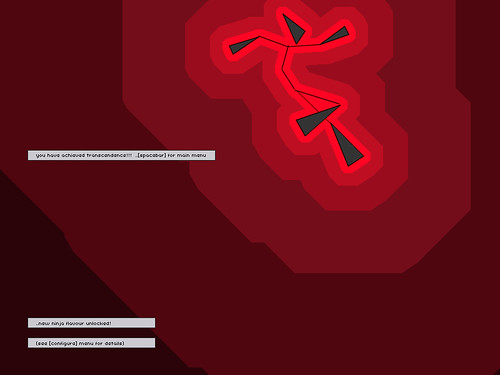
The Basics
2D side-on non-scrolling platformer in which you control a tiny black ninja. Unlike regular ninjas, this one is not all about flipping out and cutting people’s heads off – instead, he his about avoiding stuff, collecting gold (to extend his lifespan) and getting to the door to the next room so he can play air guitar, dance, punch the sky, run on the spot or simply collapse and raise one victorious arm. In his way are an array of instakill obstacles: mines, drones, seeker-drones, sniper turrets, laser turrets, machinegun drones. These things have proper in-game names, and I know them because I am cool, but these are more descriptive.
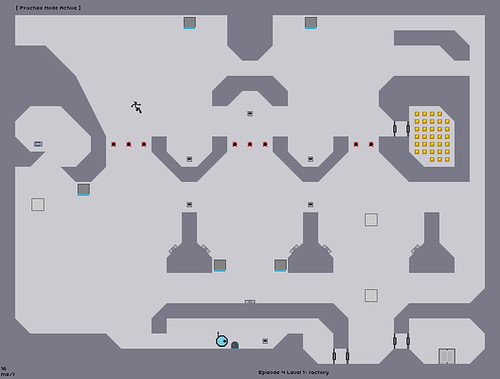
The Appeal
Moving is fun in N. It’s physics-driven, so factors like momentum and friction affect your trajectory. Picking up speed, bouncing off walls, hitting jump pads and surviving huge falls is just pure joy. You can feel the weight of the ninja, thrill at his velocity and scream as you feel the inevitability of his demise, then sob as his limp ragdoll corpse is tossed cruelly around by the objects you so carefully avoided – with one important exception – in life.
The fact that the game gets extraordinarily hard before its five hundred levels are up means that you’ll get stuck and have to redo some levels many, many times. For reasons I’ve only just recently come to understand, it doesn’t get boring. Part of it is that moving is, as I say, fun, and successfully avoiding things even more so. But what counter-acts the repetition is that you keep getting better at these early obstacles.
It’s not like normal platformers where you just jump at the right time, wall-run for the right bit, spring off and you’re done, 10/10. In N every move you make affects the angle and speed of your next, and your weak air-control means even simple jumps are organic, fluid things in which where you want to land is constantly changing in reaction to the circling drones, the focusing cross-hair of a sniper turret, the pursuing rocket. The defense systems you’re dodging are all automated, but their reactions are never the same because your actions are never quite the same. Even if you were trying to exactly replicate your previous performance, it’s not humanly possible.
And you’re not, of course. You’re instinctively trying to do it faster and more stylishly – if you pay attention you’ll actually feel yourself getting cockier. Deservedly so – you rock. Your route through these obstacles is not merely reliable, but also embued with flair, arrogance and hurtling, blinding speed. You’ll dance effortlessly through these nerve-wrackingly hazardous spaces you know like the back of your hand, carressing walls as you fly up them, stroking the tops of deadly drones as they zoom angrily past, hugging laserbeams and bullets like old friends. Nothing can touch you and nothing can stop you, except the obstacle you’re currently working on. Which will electrocute, crush, shoot, burn and explode you again and again.
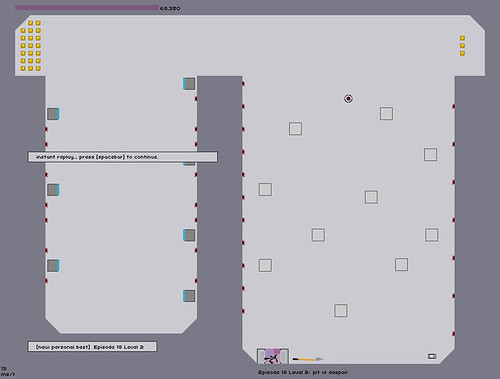
The Essential Experience
Hitting a jump-pad and, on your way up, brushing the side of a bounceblock with a gentle touch – you don’t wall-hug long enough to lose your velocity, but you do jump from it, which gives you an extra boost on your already extraordinary ascent. In N, being a fatal distance from the ground is a universe of possibilities rather than certain doom. Gaining height is both scary and exciting.
Morrowind
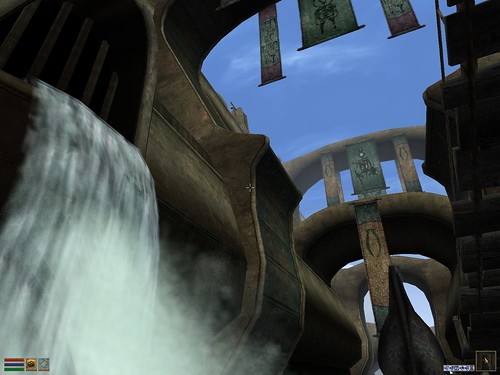
The Basics
Massively single-player first-person RPG – a huge and freely explorable fantasy world, hundreds of quests, of which the main plot line – the longest game I have ever played – accounts for less than half. You can be stealthy, fighty, magicky or any combination thereof, you can join guilds, go anywhere, kill anyone and anything and – importantly – take its clothes and anything else it might have had. Combat is real-time, and requires nimble fingers to jump around, dodge and aim. Skills level up the more you use them, rather than by assigning stat points, so you become the character you’re trying to be.
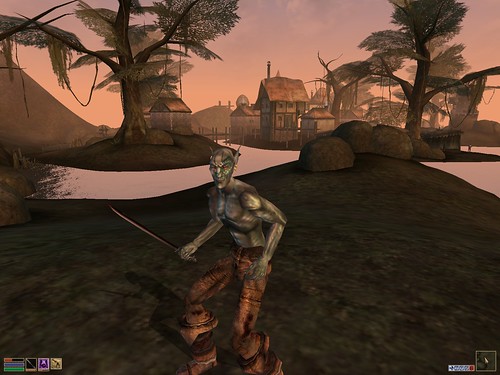
The Appeal
RPGs ought to be the best games in the world, but virtually all of them have achingly dull combat and insist on a third-person view. The Elder Scrolls series has been chugging merrily down the lineage set out by Ultima Underworld, and with each iteration, more people say “Hey, that looks way better than the frustrating and unengaging rubbish we consider good!” Morrowind was when the series moved to what we recognise today as a true 3D engine – 3D accelerated, everything made of polygons. It’s about being in an RPG world for pretty much the first time – physically hitting monsters with a sword to hurt them, having to aim your fireballs like an FPS. Climbing mountains that even the developers don’t know are climbable. Stumbling upon a wooden door set into the rock, going inside and finding a smuggler’s hide-out with bodies, diaries and a story to be deduced. Short answer: it’s first person.
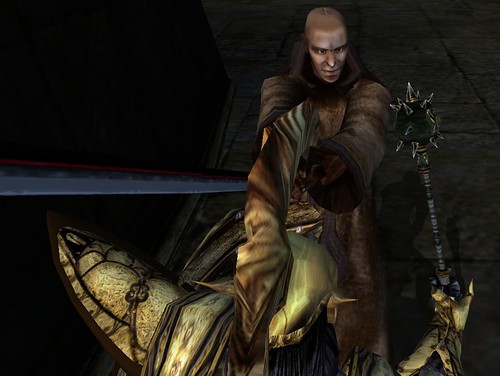
The Essential Experience
Filling out a form. It’s a clever conceit for character creation – the Census And Excise Office asks you to fill out your personal details for their records. The magic of the moment, though, is threefold: a) the music – the perfect fantasy theme tune, full of grandiose scale, promise and magic, b) the sheer range of options, even before you get to choosing skills and abilities – there are thirteen races, and c) seeing the world for the first time – you’ve just come out of a prison ship, so you get the three-hit combo of the lovely water effects, a giant tick standing in the lovely water effects, and the unearthly noise the giant tick standing in the lovely water effects makes.